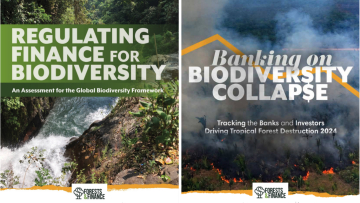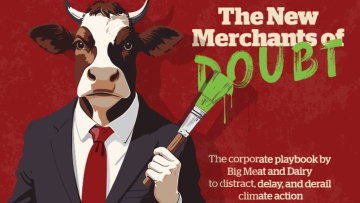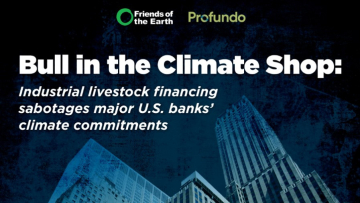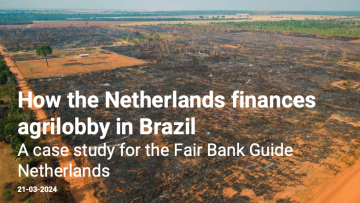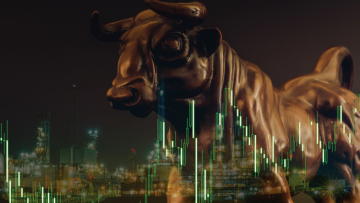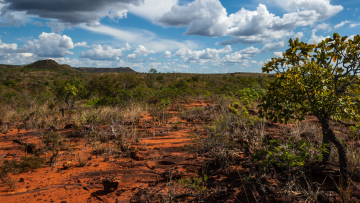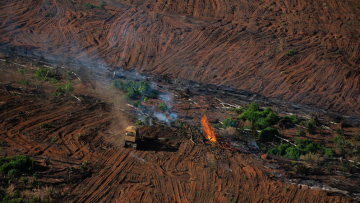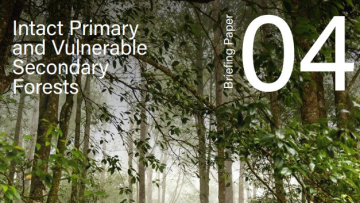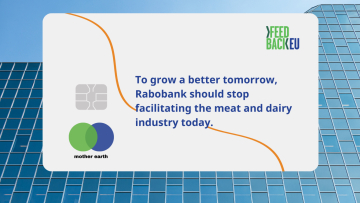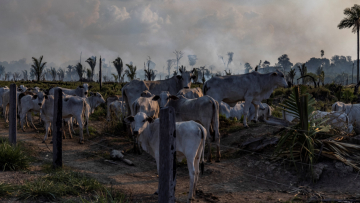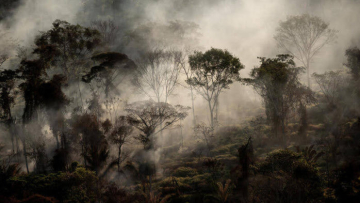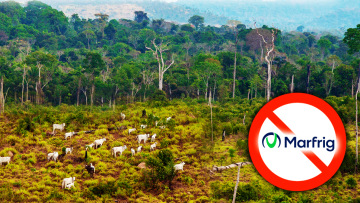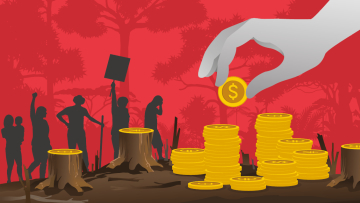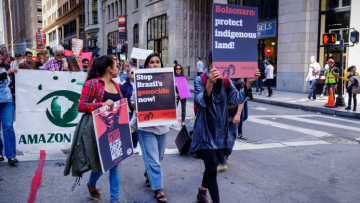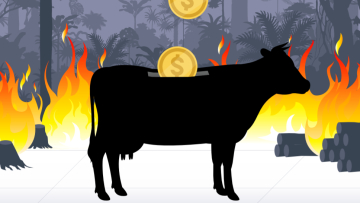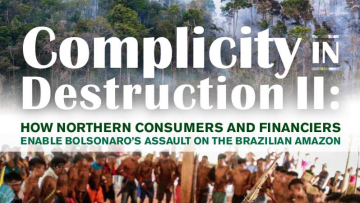
Company – On record
This profile is no longer actively maintained, with the information now possibly out of dateBankTrack
nature@banktrack.org
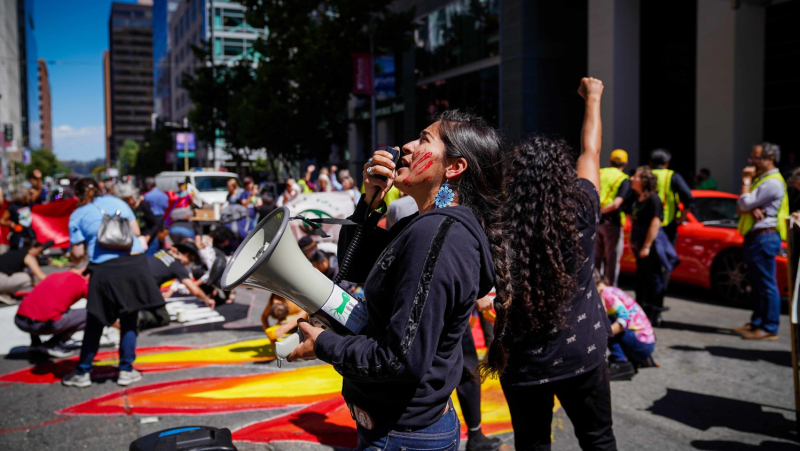
Company – On record
This profile is no longer actively maintained, with the information now possibly out of dateBankTrack
nature@banktrack.org
Why this profile?
Marfrig's major sourcing regions are linked to high deforestation risks and CO2 emissions from cattle deforestation in the Brazilian Amazon and the Cerrado biome. Although the company admitted that 53% of its cattle in the Amazon are sourced from indirect suppliers, Marfrig still does not have a system for monitoring secondary and tertiary suppliers, and so does not exclude suppliers that continue to clear forests, and that are responsible for illegal cattle ranching in reserves and Indigenous territories.
What must happen
Banks should not renew or take on new financing agreements with Marfrig until and unless it fully eliminates deforestation and land rights abuses from its entire supply chain, as the company is highly implicated in deforestation in the Amazon and Cerrado.
| Sectors | Industrial Livestock Production , Commodities Trading |
| Headquarters |
|
| Ownership |
listed on Brazil Stock Exchange
Marfrig's controlling shareholders are MMS Participações and its members. MMS Participações is controlled by Marcos Antonio Molina dos Santos and Marcia Aparecida Pascoal Marcal dos Santos, each with a 50% stake. Marfrig's complete shareholder structure can be accessed here. |
| Subsidiaries |
|
| Website | https://www.marfrig.com.br/en/home |
Marfrig is among the three major meatpackers in Brazil, alongside JBS and Minerva. The company was the second-largest exporter of beef from Brazil in 2017. It is headquartered in São Paulo and has an operational base in 11 countries. It owns 20 slaughterhouses and several other processing plants in Brazil, Argentina, Chile, Uruguay and the US. Marfrig exports to over a hundred countries and is the second-largest beef producer in the world. It has a global slaughtering capacity of approximately 31.2 thousand heads/day.
Impact on human rights and communities
Animal agriculture is connected to a myriad of social and environmental impacts, including uncertain land rights, violence, corruption as well as high greenhouse gas emissions, water consumption, and deforestation. In 2019 there were over 160 cases of land invasion, illegal exploitation of natural resources, and damage to property in 153 indigenous territories in Brazil. Livestock grazing provoked 80% of these invasions.
Land grabbing and Indigenous’ rights violations: An investigation by Global Witness found that Marfrig has sourced cattle from ranchers involved in various human and Indigenous rights abuses, including a violent land dispute in Apyterewa, one of the Amazon’s most biodiverse Indigenous areas. Apyterewa, more than five times the size of Mexico City, is home to the Parákanã indigenous peoples. According to the investigation, in 2013 the Brazilian government’s Indigenous institute (FUNAI) accused rancher Orcimar Arantes to Prado, and other ranchers, of land grabbing in Apyterewa and of plotting to bomb an area inside the territory. Another ranch illegally located inside the Parakana’s land was an indirect supplier linked to the Marfrig’s supply chain. A rancher by the name of Antonio Borges Belfort, illegally reared cattle in Apyterewa between 2016 and 2019 in his ranch Fazenda Sol Nascente, containing over 45 hectares of illegal deforestation, sending the cows to a legal farm he owned, Fazenda Serra de Pedra, from which the beef giant then bought 274 cattle between 2018 and 2019.
In 2020, Marfrig was connected to an illegal scheme of cattle production that originated from illegal ranches located within Indigenous Peoples’ territories in the Amazon. The company’s failure to track the violations within its supply chain has resulted in the buying of cattle from ranchers accused of land-grabbing and human rights abuses against Indigenous Peoples and land rights activists.
A 2022 enquiry by the Bureau of Investigative Journalism found that Marfrig is also involved in the Mỹky’s land dispute, an indigenous community’s struggle to obtain recognition of its ancestral home in Brazil. Situated in Mato Grosso, the Menku territory is on the edge of the Amazon rainforest and the Cerrado savanna, but has not yet been formally recognised as belonging to the Mỹky. This loophole allowed several cattle farms to expand in the area, although Brazil’s Constitution is supposed to protect all lands traditionally occupied by Indigenous people regardless of their official status. Cattle raised there recently entered Marfrig’s supply chain through the legal Tangará da Serra abattoir, owned by the company itself. Another two suppliers’ properties overlap with the Menku territory, one of which directly sold cattle to Marfrig in 2019. The Mỹky are now being heard in Brazil’s supreme court but the dispute remains unsettled.
Impact on climate
Largely driven by the cattle industry, deforestation in Latin America reduces the capacity of rainforests to absorb carbon dioxide from the atmosphere and to act as carbon sinks, which would help reduce the impacts of fossil fuel emissions. The Brazilian Amazon, in which Marfrig operates several of its slaughtering and processing plants, has been so impacted that some portions of it may already be releasing more carbon than they store.
The Cerrado biome, where the company owns several other plants and sources a share of its cattle, stores the equivalent of 13.7 billion tons of carbon dioxide (CO2). However, the emissions resulting from converting its native vegetation into cattle ranches and agricultural land will prevent Brazil from reaching its international commitments in emission reductions as it is responsible for an estimated 250 million metric tons of CO2. This area receives far less public attention than the Amazon ecosystem, and even weaker regulations allow for destructive land practices.
Wildfires are more frequent in recently deforested areas, and the use of fire for land clearing further contributes to global CO2 emissions. The cattle industry plays a major role in these processes, as fire is used to open space for profitable cattle-ranching. The deforestation caused by this industry is collectively responsible for the release of 340 million tons of carbon each year, equivalent to 3.4% of current global emissions.
Impact on nature and environment
Deforestation: Amazon deforestation is achieving the point of no return, while almost half of the Cerrado’s native vegetation has already been destroyed and turned into pasture and croplands. Two agricultural activities, cattle ranching and soy production, are the leading drivers of deforestation in Brazil. Ranching alone leads to approximately 80% of Amazon deforestation, with 80% of Amazon forests cleared since 2014 being occupied by cattle. It is estimated 70% of cleared lands in the Brazilian Amazon are now populated by cattle, leading Brazil to have the second largest herd in the world.
Marfrig has repeatedly been accused of buying cattle raised on deforested areas. According to a study published by the National Academy of Sciences, between 2015-2017, Marfrig cattle purchases were linked to roughly 26,000 hectares of deforestation risk. Another study found that Marfrig, JBS and Minerva are directly linked to more than 17,000 hectares of illegal deforestation just in the Amazon state of Para. According to an investigation by Global Witness, between 2017 and 2019, Marfrig bought cattle from a total of 89 ranches responsible for over 3,300 hectares of illegal deforestation. Marfrig has publicly acknowledged that it bought cattle from farmers located at the epicentre of the deliberate burning of Amazon forests in 2019.
Marfrig has not signed the Term of Conduct Adjustment (TAC) in the state of Pará, meaning that it does not deliver audits to the Federal Ministry in Brazil. Instead the company has used a voluntary self-declaratory mechanism for its suppliers called a Request Form of Information (RFI) since 2013. 53% of its cattle in the Amazon are sourced from indirect suppliers, but Marfrig still does not have an established system for monitoring secondary and tertiary suppliers, and so does not exclude suppliers that continue to clear forests, and that are responsible for illegal cattle ranching in reserves and Indigenous territories, despite committing to do this over a decade ago. The company says that it has no systematic verification of indirect suppliers amid “the lack of a nationally implemented public traceability policy [which] makes it difficult to implement such a verification.” Marfrig has now made the promise to achieve 100% traceability and zero deforestation in its supply chain by 2025 in the Amazon and by 2030 in the Cerrado biome through origin control for indirect suppliers, but in 2021 the company still hadn’t identified 37% of the ranches which sell cattle to Marfrig’s direct suppliers.
Despite these pledges, the enquiry by the Bureau of Investigative Journalism found that multiple suppliers of Marfrig were still linked to over 150 square kilometres of recently deforested areas in 2022.
Loss of biodiversity: Industrial agriculture and deforestation have dramatically reduced the habitat of tens of thousands of plant and animal species, damaging not just the rainforest's ability to act as a climate stabiliser but its role as the world's greatest reservoir of biodiversity. Among these species are the rarely sighted spotted tiger cat and the tapir. Both are on the International Union for Conservation of Nature’s red list of threatened species.
Impact on pandemics
Changes in ecosystems increase interactions between animal species that would otherwise not get in close contact. As the cattle industry drives deforestation in Latin America, pastures and ranches push human encroachment onto natural resources.
In the Amazon rainforest in particular, deforestation and fires set animals on the move to find new livable habitats. They relocate, bringing along pathogens and the risk of disease spillovers between species. Cattle ranching nearby or within the Amazon, as well as land clearing for further expansion, is a major factor of risk for the emergence of zoonotic diseases. Domestic cattle can even act as a bridge for viruses between wildlife and humans. By operating slaughterhouses in the Brazilian Amazon and the Cerrado biome, and being unable to track the sources of its cattle, Marfrig contributes to increasing this risk.
According to researchers at the Oswaldo Cruz Foundation, a Brazilian public health institute, a strong disease risk has been identified in converting Amazonian forest into pastures and fieldsas these land uses attract marsupials and rodents, carriers of hantaviruses. In Brazil, the recent emergence of such viruses, among others, has been a clear warning of the dangers of the expansion of anthropogenic activities in the rainforest.
Other impacts
Corruption: A considerable number of sources report on Marfrig’s involvement in corrupt practices. The company was accused of committing fraud from 2006 to 2012 when, in partnership with a local politician, it allegedly paid bribes to obtain the necessary licences for its operations. In 2018, Marfrig was ordered to pay 8 million reais for administrative misconduct in Mato Grosso. Also, according to various media reports, the founder and chairman of the board of Marfrig made a payment agreement of 100 million reais (roughly USD 20 million) as a result of the Cui Bono operation - an investigation carried out by the Federal Public Ministry and the Federal Police related to amounts paid as bribes by Marfrig to receive loans from the public financial institution Caixa Economica Federal. In the same year, the founder and chairman was accused of insider trading by the Brazilian Securities Commission.
In 2017, it came to light that executives of Marfrig (as well as JBS) were embroiled in the sprawling Car Wash affair, one of the biggest corruption scandals of all time. Illegal payments of more than $5bn to company executives and political parties exposed a vast and extraordinarily intricate web of corruption in Brazilian politics. It was found that doleiros (black market money dealers) were laundering money on behalf of executives at Petrobras, channelling millions of dollars into secret slush funds. Petrobras directors then used those funds to funnel money to the politicians who had appointed them in the first place, and to the political parties they represented. The main objective of the racket – which fleeced taxpayers and shareholders out of billions of dollars – was to fund election campaigns to keep the governing coalition in power. Everyone connected to the deals received a bribe, in cash, or sometimes in the form of luxury cars, expensive art works, Rolex watches, $3,000 bottles of wine, yachts and helicopters. Huge sums were deposited in Swiss bank accounts, or laundered via overseas property deals or smaller companies. The means of transfer were deliberately complicated, in order to hide the money’s origins, or low-tech, to keep it off the books.
Santander, alongside BNP Paribas and ING Bank were also lead arrangers for Marfrig’s ‘sustainable transition bond’ – announced at the height of the media coverage of the 2019 Amazon fires. This bond however is voluntary, relying on the goodwill of direct suppliers to report back and do not specify what Marfrig will do with that information to ensure its indirect suppliers with deforestation are blocked. Hence, PGGM - a Dutch investment group - stated that Marfrig’s so-called sustainable bonds could “not qualify as a sustainability bond” because it wasn’t “financing new sustainable activities or investing in a climate solution.”
What does your food have to do with the invasion of Indigenous land?
THIS Is How MEAT Is Destroying The AMAZON
2022
2022-10-17 00:00:00 | BNP Paribas receives formal notice for financing Marfrig
In October 2022, a coalition of NGOs sent a first-of-its-kind letter of notice to BNP Paribas to highlight the serious abuses enabled by its client Marfrig in Latin America. The meatpacker’s activities constitute a sufficient reason to sue BNP Paribas under the French Duty of Vigilance Law. The regulation in fact requires French multinational corporations to establish due diligence measures to identify and prevent violations of human rights and of environmental justice which may result from the company’s activities worldwide.
2022-02-23 00:00:00 | IDB Invest drops controversial loan to Brazilian beef giant Marfrig Global Foods
IDB Invest, the private arm of the Inter-American Development Bank (IDB) Group, is no longer considering a $43 million loan package for Marfrig Global Foods’ Brazilian beef operations. The IDB Invest loan, which would have leveraged an additional $157 million from other sources, was originally scheduled for a board vote on December 8, 2021, which was then delayed to May 4, 2022. According to IDB Invest, the loan “has been interrupted“ and “is no longer considered for approval.” In October 2021, a public letter signed by more than 200 groups, including BankTrack, (now more than 275 signatories) was sent to the Bank’s board of directors, citing potential bank policy violations and denouncing the loan for the role it could play in fueling deforestation and land grabbing, given the problems inherently related to the investment sector and the company’s history of social and environmental rights violations. Since then, dozens of groups have reached out to the bank’s executive directors urging opposition to the loan. The Divest Factory Farming Campaign, the driving force behind this opposition, also launched a public social media campaign against the loan in November using hashtag #DivestFactoryFarming.


